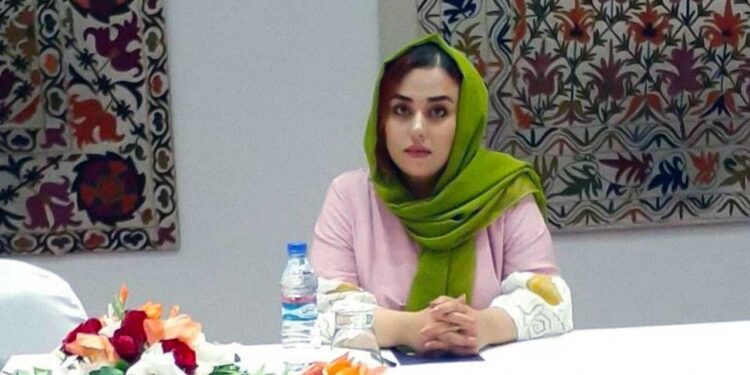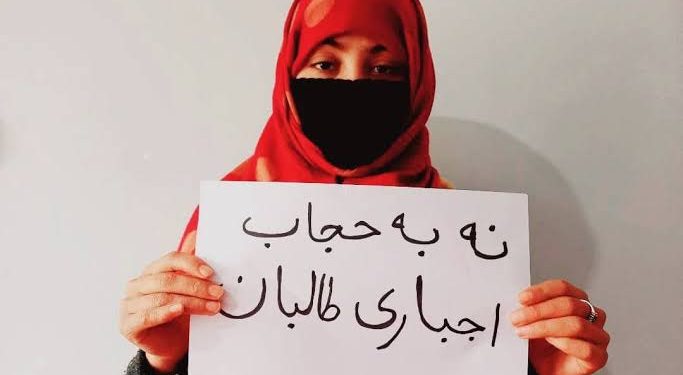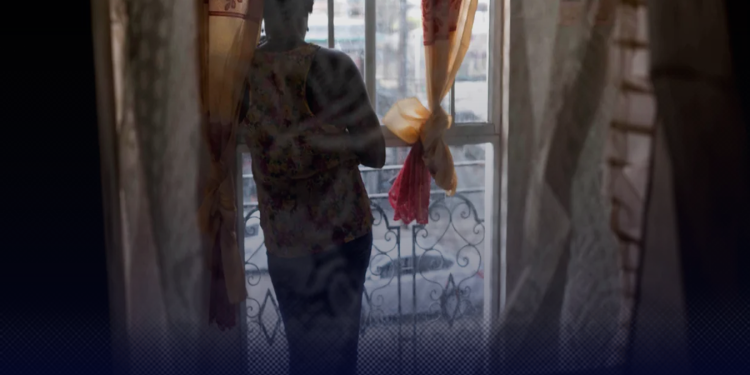This interview series is funded by the International Development Research Centre (IDRC) through a project entitled ‘Placement, Preservation and Perseverance: Afghan at-risk Scholars, Students and Activists’ (PPP) based in the Department of Law and Legal Studies at Carleton University
Meetra Qutb graduated from the Faculty of Law and Political Sciences at Kabul University. She served as an assistant professor there for a year before pursuing further education in Germany, where she earned a master’s degree in public economics, law, and politics. She then obtained a second master’s degree in international human rights in England. Qutb has worked with various human rights and research organizations in Germany and the UK. Additionally, she spent a year as a presenter and producer for Afghanistan International TV. She is currently employed at a research institution in London.
Interviewed by: Aman Mirzaei
Nimrokh: What has been your personal experience during the 20 years of the Republic regime, Mrs. Meetra Qutb? What roles and tasks have you undertaken in Afghanistan?
Meetra Qutb: I grew up in Afghanistan and experienced the first Taliban regime as a child, attending underground schools. When the Taliban first came to power, I was in kindergarten. I studied at the university until 2013, and after completing my studies, I worked with an international organization focused on human rights development. I then joined the university staff. I stayed in Afghanistan for nearly two years after finishing university, before moving to Germany to continue my education. From 2015 until the fall of Kabul, I traveled back to Afghanistan periodically, but did not reside there permanently as I was studying abroad.
Nimrokh: Given your work with Afghanistan International TV and your interviews on human rights issues, which areas did you focus on? Do you believe that verbal violence against women in social media has increased since the Taliban’s return to power?
Meetra Qutb: During my time at Afghanistan International TV, I primarily covered issues related to human rights, as well as women’s and minority rights. My reports focused on women’s demonstrations and protests, and I worked extensively on human rights topics, including women’s rights and their ongoing struggles. I reported on the findings of human rights organizations concerning Afghanistan, leveraging my background in international human rights and law.
In my interviews, too, I placed significant emphasis on human rights issues, recognizing the need to investigate and address the situation of women and ethnoreligious groups. For example, I conducted an interview about a study by a human rights monitoring organization on the rise of online violence against women. The study noted that online violence against women and women’s rights activists increased substantially, particularly after the Taliban’s return to power. As women and women’s rights activists took to the streets to protest and demand their fundamental rights, they were met with violent repression from the Taliban. The group used gunfire and high-pressure water cannons to disperse the protesters. Following the street protests, the Taliban began arresting and imprisoning female protestors, many of whom were tortured. Consequently, women moved their protests indoors, demonstrating behind closed doors to avoid being identified in videos and photos. Their only tool was social media, which they used to publish their protests and amplify their voices beyond Afghanistan. Campaigns were launched on social media, but even there, these women who turned to these platforms for safety faced verbal violence and harassment.
According to research conducted by a British human rights monitoring organization, these acts of violence were widespread, with Afghan women activists facing religious, political, and ethnic insults. The study identified four main narratives targeting women: accusations of sexual immorality, violating cultural and religious traditions, being agents of Western countries, and attempting to leave the country. The research compared violence against politically active women from June to December 2021 with the same period in 2022, revealing that online violence tripled in 2022. Notably, the research highlighted that active and protesting women even received harsh and obscene messages, immoral images, and threats of sexual assault and death, in their messengers.
These acts of violence impact women both online and in their everyday lives. Victims often face anxiety, fear, and various mental health issues. Many resort to self-censorship and temporarily withdraw from online spaces and even family gatherings. In the long run, online violence leads to decreased activity on social media and hinders women’s political participation. Furthermore, it can heighten men’s control over women’s behavior and clothing, ultimately contributing to an increase in domestic violence.
Nimrokh: As a human rights activist with extensive experience, you are well-acquainted with the violence against women. How do you perceive the Taliban’s impact on the rise in various forms of violence, including domestic violence, threats and torture, and street violence?
Meetra Qutb: Violence against women, both verbal and physical, has always been present, but it has significantly increased since the Taliban took power. Online violence has proliferated in social media, and domestic violence has also surged. The Taliban dismantled institutions established over the past twenty years to protect women’s rights. They shut down the Ministry of Women’s Affairs and dissolved the Independent Human Rights Commission and the Prosecutor’s Office for the Prohibition of Violence against Women. There was, and still is, no authority for women to turn to for their rights. Consequently, women have lost the legal protections that existed under the republic, leading to a marked increase in violence against them.
Furthermore, over the past two and a half years, a culture of impunity has emerged. The Taliban show no interest in investigating cases of violence against women, and cultural and traditional factors deter families from seeking justice. This culture of impunity enables perpetrators to act without fear of consequences. Moreover, the Taliban regime systematically discriminates against women, and there is little expectation that they will support female victims of violence. The rise in violence against women is also linked to the restrictions enforced by the Taliban. Human rights organizations report that the Taliban’s restrictive policies and the culture of impunity have contributed to a rise in femicide, forced marriages, child marriages, and gender-based violence in Afghanistan.
Nimrokh: Can you describe women’s experiences regarding civil and political rights during the twenty years of the republic, and how would you assess this period?
Meetra Qutb: After the Taliban fell in 2001 and the republic was established, many opportunities opened up for women. They could resume their education, join the workforce, and participate actively in political, social, and economic spheres. While it’s true that women in many remote areas of Afghanistan still faced barriers to education, a class of informed women emerged who could stand up to the Taliban and advocate for their rights. Comparing today to the first Taliban regime in the 1990s, no women took to the streets to fight back then. However, by 2021, when the Taliban regained power, they were met with unexpected resistance. From day one, many women protested in the streets, showing that in the past twenty years, women had become aware of their rights, formed movements and groups, gained the tools to fight for their rights, and established connections with the outside world through the Internet and various programs. This represents one of the significant changes under the Republic. Additionally, women’s struggles for justice have been central to international dialogues and summits focused on not recognizing the Taliban.
Nimrokh: You mentioned that the past 20 years of the Republic provided significant opportunities for women—they pursued education, gained political awareness, and built movements and organizations. This has positioned women at the forefront of the fight against the Taliban. Have these efforts been effective? Will they impact the future of women’s political participation?
Meetra Qutb: Absolutely, these efforts are bound to be influential because future generations will learn from the justice struggles of Afghan women. Over the past two and a half years, women have made immense sacrifices. Despite living in a deeply patriarchal and traditional society, they formed movements amidst numerous restrictions and began fighting for their basic rights. The women who took to the streets will be seen as heroes today and in the future. They risked being killed, tortured, and raped, fully aware that the Taliban have not changed and will not change, yet they still spoke out to make their voices and their nation’s plight heard around the world. Their protests serve as a model for other countries where women’s rights are not respected.
As part of the diaspora, we are responsible for amplifying Afghan women’s voices and struggles. We have more tools at our disposal than those inside Afghanistan—freedom of speech and safety from the immediate dangers they face. Therefore, we can advocate, protest, and be their voice in Western countries. I believe the Afghan women’s movement is so impactful that it will be remembered in the history of justice advocacy and women’s movements in Afghanistan.
Nimrokh: As a member of the Afghan diaspora community, what role do you believe the diaspora can play in supporting women’s protests and struggles in the current situation in Afghanistan?
Meetra Qutb: As I mentioned, we can amplify women’s voices globally and raise awareness about the situation in Afghanistan. It is now the only country where girls above sixth grade are barred from school, universities are shut down, women are increasingly excluded from society, and their primary platform is social media, where they still face violence and must self-censor. As members of the diaspora, we must speak up for Afghan women and convey their messages to the world. We need to draw Western politicians’ attention to Afghanistan’s dire situation and inform the global community about the Taliban’s widespread and systematic discrimination against Afghan women. We should aim to avoid recognizing or engaging with the Taliban. Most importantly, we must keep Afghanistan’s plight in the global news and prevent it from being forgotten. Unfortunately, due to the risks of arrest and torture, women’s street protests have diminished and are mostly conducted indoors. Social media is the only way to showcase these protests, and as the diaspora, we must keep this issue alive by supporting the active women in Afghanistan, participating in various programs, and voicing the protesters’ concerns.
Nimrokh: What is your prediction about the future of women in Afghanistan? What kind of political system do you envision, and how do you see women’s political participation?
Meetra Qutb: Despite the current complex situation in Afghanistan, the Taliban’s terrorist regime won’t be sustainable. The women advocating for Afghan women’s rights today should lead any future government, and their roles must not be overlooked. Ignoring their role would be a severe injustice. Women are the primary victims of the Taliban regime, and disregarding their sacrifices to allow a male-dominated decision-making process would be highly unfair. In any future political system, women must have equal rights with men. Additionally, Afghanistan’s diverse ethnic and religious groups must all participate in the political system, reflecting their rights and desires. A centralized system controlled by one group won’t bring political stability to Afghanistan. Therefore, fair power distribution among all groups is crucial for political stability. A system based on equitable power distribution and non-discrimination will benefit all Afghan citizens. The constitution of the new system should be founded on principles of power sharing and recognizing the ethnic diversity of Afghan society. This approach will ensure political stability, justice, and respect for the country’s ethnic, religious, and linguistic diversity.






